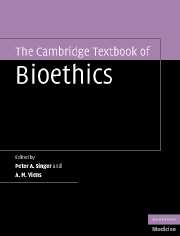Book contents
- Frontmatter
- Contents
- List of contributors
- Acknowledgements
- 1 Introduction
- Section I Information problems
- Introduction
- 2 Consent
- 3 Capacity
- 4 Disclosure
- 5 Voluntariness
- 6 Truth telling
- 7 Confidentiality
- Section II End of life care
- Section III Pregnant women and children
- Section IV Genetics and biotechnology
- Section V Research ethics
- Section VI Health systems and institutions
- Section VII Using clinical ethics to make an impact in healthcare
- Section VIII Global health ethics
- Section IX Religious and cultural perspectives in bioethics
- Section X Specialty bioethics
- Index
- References
6 - Truth telling
Published online by Cambridge University Press: 30 October 2009
- Frontmatter
- Contents
- List of contributors
- Acknowledgements
- 1 Introduction
- Section I Information problems
- Introduction
- 2 Consent
- 3 Capacity
- 4 Disclosure
- 5 Voluntariness
- 6 Truth telling
- 7 Confidentiality
- Section II End of life care
- Section III Pregnant women and children
- Section IV Genetics and biotechnology
- Section V Research ethics
- Section VI Health systems and institutions
- Section VII Using clinical ethics to make an impact in healthcare
- Section VIII Global health ethics
- Section IX Religious and cultural perspectives in bioethics
- Section X Specialty bioethics
- Index
- References
Summary
Mr. H is 26 years old and has recently joined a general practitioner's list. The patient's past medical history is most notable for an episode several years previously of unilateral arm weakness and visual blurring without headache that resolved within 12 hours. He was referred to a neurologist, who did many tests and told him it was likely a transient viral infection and he should return if the symptoms recurred. Mr. H thought no more about it and has had no similar episodes since then. His medical records contain a letter from the neurologist to the previous family physician stating that Mr. H almost certainly has multiple sclerosis. The neurologist explains that he does not disclose the diagnosis in the early stages because he is concerned about causing excessive worry.
Ms. I is a 56-year-old dishwasher admitted with jaundice and anemia. Investigations have revealed advanced cholangiocarcinoma. Her family insists she not be told, explaining that families in their culture act on behalf of ill relatives. They argue that telling her the diagnosis of cancer would cause her to lose hope and so forbid its disclosure to her by medical staff. “Leave it to us to tell her what she needs to know,” they say. A staff member who speaks their language overhears them telling Ms. F that everything will be fine and that she will be able to go home soon.
- Type
- Chapter
- Information
- The Cambridge Textbook of Bioethics , pp. 36 - 42Publisher: Cambridge University PressPrint publication year: 2008



